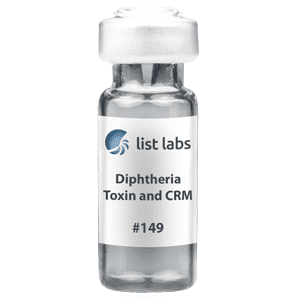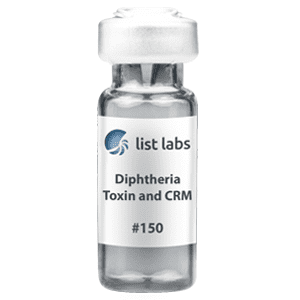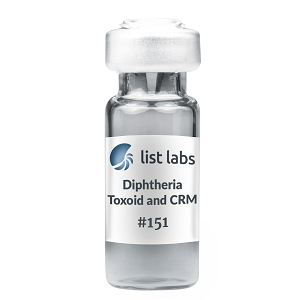Have a specific question about your LBP project? Click below and let’s get started.
Diphtheria Toxin and CRM
Buy Diphtheria Toxin and CRM
- Products
- Information
- Related Citations
- Related Blog
Diphtheria Toxin Product Details
| Description | Formulation | Abbrev. | Product # | ||||||
| TOXIN | |||||||||
| Diphtheria Toxin, unnicked from Corynebacterium diphtheriae | Lyophilized in Buffer | DT | 150 | ||||||
| TOXOID | |||||||||
| Diphtheria Toxoid, from Corynebacterium diphtheriae | Lyophilized in Buffer | DTd | 151 | ||||||
| CRM | |||||||||
| Diphtheria Toxin CRM Mutant | Lyophilized in Buffer | CRM 197 | 149A | ||||||
Cholera Toxins for Sale
#149A (0.25 mg)
$525.00
#150 (1 mg)
Diphtheria Toxin, Unnicked, from Corynebacterium diphtheriae
This product is Out of stock.Diphtheria Toxin
Diphtheria toxin (DT) is synthesized by certain strains of Corynebacterium diphtheriae and secreted as an inactive proenzyme, composed of a single polypeptide chain having an approximate molecular weight of 58 kDa. DT enzymatic activity is expressed when the proenzyme is nicked into two fragments, A and B, linked by a disulfide bond, then reduced with thiols releasing the N-terminal A fragment (molecular weight 21 kDa). The C-terminal B fragment (molecular weight 37 kDa) has no apparent enzymatic activity but is required for toxicity. Evidence suggests that the B fragment is responsible for recognizing and binding the toxin to cell surface receptors.
Diphtheria toxin catalyzes the ADP-ribosylation of eukaryotic aminoacyl-transferase II (EF-2) using NAD as a substrate, the basis for its toxicity toward eukaryotic organisms. Diphtheria toxin receptor (DTR) is a cell-surface expressed heparin-binding epidermal growth factor-like growth factor precursor (HB-EGF). In monkey cells, another membrane protein, CD-9 increases the affinity of diphtheria toxin for HB-EGF, indicating that two proteins may function together as a receptor.
Sensitivity of mammalian cell lines to diphtheria toxin varies with the presence of receptors. Monkey Vero cells are highly sensitive, hamster cells moderately sensitive, whereas rat and mouse cells without receptors are resistant. An injection of DT has relatively minor effects on normal mice and is used to selectively and transiently deplete the population of specific types of immune cells genetically attached with simian or human DTR. Use of DT in this way allows the normal development of the immune system followed by the selective elimination of specific cells. These studies allow conclusions about the function of the modified cells in various processes.
Diphtheria toxin preparations from C. diphtheriae Park Williams strain 8, are highly purified and unnicked. When followed by trypsin treatment and reduction with dithiothreitol, DT from List exhibits high specific activity. Diphtheria toxin is active on CHO19 or Vero20 cells when diluted to a nanogram or less per milliliter.
- Product #150 Diphtheria toxin, unnicked, from C. diphtheriae, is provided lyophilized in Tris buffer. As toxicity may vary by lot, each laboratory should determine the optimum dosage for each particular application.
Diphtheria Toxin CRM Mutant
Diphtheria toxin CRM Mutant (CRM 197) is a non-toxic, cross reactive DT mutant containing a lesion in the A chain blocking ADP-ribosylation. CRM results from a single base change in the structural gene resulting in the substitution of glutamic acid for glycine. While CRM shows no enzymatic activity, it is immunologically indistinguishable from diphtheria toxin.
In its applications, CRM 197 is similar to diphtheria toxoid. CRM has the advantage of being a well-defined protein in contrast to formaldehyde treated toxin (toxoid) which is non-specifically cross linked and subject to rearrangement. CRM functions as a carrier for polysaccharides and haptens, making them immunogenic.
Diphtheria toxin CRM Mutant preparations from C. diphtheriae are highly purified and migrate as a single major 58 kDa band when examined on SDS-PAGE.
- Product #149 Diphtheria toxin CRM Mutant is provided lyophilized in sodium phosphate buffer.
Diphtheria Toxoid
Diphtheria toxoid (DTd) is prepared by formaldehyde inactivation of purified diphtheria toxin. Inactivated bacterial toxins, including DTd, are widely used as protein carriers chemically conjugated to oligosaccarides in licensed vaccines, which induce a more robust immune response against the carbohydrate.
- Product #151 Diphtheria toxoid is provided lyophilized in sodium phosphate buffer. Cytotoxicity testing results are described on a C of A that is included with every shipment.

October 17, 2019
By: List Labs
List Labs currently has over 3300 citations with more being added every month! Within our citations page, we provide the ability to search and sort from over 100 cataloged items that are offered here. We are honored to supply researchers worldwide with highly purified bacterial toxins that can potentially be instrumental in helping to change […]
July 23, 2018
By: douano@listlabs.com
By: Mary N. Wessling, Ph.D. ELS In this blog we will unravel the terminology describing bacterial toxins. In general, there are at least three ways that bacterial toxins are described in the literature: by their biological designation—the genus and/or species from which they come by the origin of the toxin, either as innate to the […]
March 19, 2018
By: douano@listlabs.com
By: Mary N. Wessling, Ph.D. ELS List Biological Laboratories’ (List Labs) catalog of products is related to furthering research in human health and preventing disease, most commonly as the starting materials for vaccine research & development or production around the world. Vaccines are mainly identified for their capacity to prevent diseases that the body’s innate defensive […]
January 8, 2018
By: douano@listlabs.com
By: Rachel Berlin, Marketing Manager The List Labs website hosts a library of scientific article abstracts related to the research performed using our products called the Citations Page. Visitors can search this library to learn how others have used List Labs’ reagents in their research. This valuable resource is updated monthly with new articles from a wide variety […]
March 27, 2017
By: douano@listlabs.com
By: Mary N. Wessling, Ph.D. ELS Cross-Reacting Materials: The Motor Behind Conjugate Vaccines Vaccines in history The history and practice of vaccination as protection against viral infection is often thought to begin with Edward Jenner’s discovery that cowpox, a viral infection of cows, prevented smallpox in humans. However, it had long been suspected that survivors […]
December 12, 2016
By: List Labs
By: Suzanne Canada, Ph.D. Diphtheria toxin is an important tool used for selective killing (ablation) of cells for research purposes. Using this technique, dubbed “toxin receptor–mediated cell knockout” when it was first used [1], researchers can selectively remove a specific type of cell in a live mouse without having to generate transgenic “knockout” animals, which […]
August 15, 2016
By: douano@listlabs.com
By: Md. Elias, Ph.D, Senior Scientist List Labs is one of the leading manufacturers of high quality adjuvants from bacterial sources. Our highly purified adjuvants for research and development are Tetanus Toxoid (Product #191), Cholera Toxin B Subunit (Product #104), Diphtheria Toxin CRM197 Mutant (Product #149), Adenylate Cyclase Mutant, Cya-AC– (Product #198L), Pertusis Toxin Mutant (Product #184), […]
April 25, 2016
By: douano@listlabs.com
By: Karen Crawford, Ph.D., President In 1983, List Labs introduced Diphtheria Toxin to the research community. Researchers have purchased Diphtheria Toxin for various uses. One common use is cell ablation. The receptor for Diphtheria Toxin is also called heparin-binding EGF-like growth factor (HB-EGF). This receptor, located on several cell types, binds Diphtheria Toxin, allowing the toxin to enter […]
April 6, 2015
By: List Labs
By: Suzanne Canada, Ph.D. Tanager Medical Writing Concerns over outbreaks of potentially serious childhood diseases are in the news again in California with an increase in whooping cough infections in 2014, caused by the pathogen Bordetella pertussis, and a measles outbreak in December 2014 to February 2015. Since outbreaks and epidemics may be infrequent, many […]
January 26, 2015
By: List Labs
By: Suzanne Canada, Ph.D. Tanager Medical Writing An exciting report was released in October about a new class of targeted anti-tumor drugs, in which genetically engineered stem cells were used to deliver cytotoxins to brain tumors.1 Brain cancers known as glioblastomas (GBM) are notoriously difficult to treat because the tumors often re-grow after surgery and because […]
October 21, 2014
By: List Labs
By: Suzanne Canada, Ph.D. Tanager Medical Writing Vaccines have been used to help control diseases for more than 200 years and are the common practice for children and adults. Childhood vaccination has substantially reduced the morbidity and mortality from infectious diseases in much of the developed world, and influenza vaccinations have reduced the impact […]
List Labs
540 Division Street
Campbell, California
List Biotherapeutics
9800 Crosspoint BIvd Suite 2011
Indianapolis, IN 46256, USA


- © 2024 List Biological Labs, Inc
- Privacy Policy
- Terms of Use
- Cookie Preferences







